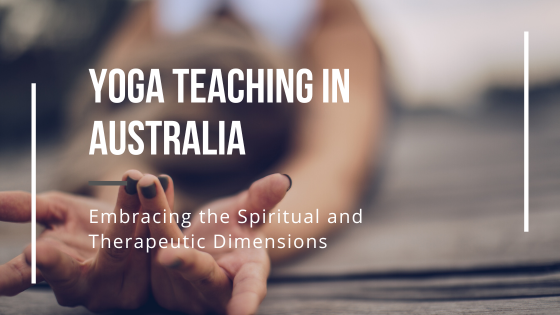Yoga, renowned for its wholistic approach to physical, mental, and spiritual well-being, has seen a surge in popularity worldwide, including in Australia. It is crucial to recognize that in Australia, yoga is not considered an allied health profession, and that yoga teachers and yoga therapists are not registered health practitioners. With online learning booming and yoga teacher trainings popping up all over the place it is important to realise that becoming a yoga teacher entails far more than completing a brief 10-hour online course! Such a minimal online training programs cannot adequately equip individuals to become yoga teachers, particularly when it comes to teaching therapeutic and spiritually enriching yoga. Much more study and personal practice is required in order to do honour to teaching yoga. The multi-dimensional nature of yoga teaching encompasses both physical and spiritual aspects, and comprehensive training programs are essential.
The Nature of Yoga Teaching
Yoga represents a multi-dimensional discipline that encompasses physical postures, pranayama (breath control), meditation, and the philosophical dimensions of well-being and living well. Teaching yoga effectively and authentically demands a profound understanding of these elements, extending far beyond the scope of a few hours training online. This is especially crucial when considering the spiritual and therapeutic facets of yoga.
In-Depth Understanding: Teaching therapeutic and spiritually grounded yoga necessitates an extensive grasp of yogic philosophy, as well as the study of human systems both from an energetic and biopsychosocial perspective. Yoga teachers and especially yoga therapists must be taught how to consider the unique therapeutic requirements of individuals. It involves adapting yoga practices to address various health conditions, injuries, and limitations—knowledge that cannot be acquired in a short online course.
Teaching Proficiency: Competent yoga teaching is contingent upon excellent communication and instructional skills. A brief online course does not provide adequate opportunities for trainees to develop these vital teaching skills, which are indispensable for guiding students safely and authentically on their spiritual and healing journeys.
Experiential Learning: Mastery in yoga teaching, particularly in the spiritual and therapeutic domains, demands years of personal practice and hands-on experience. Proficiency in adapting practices to suit diverse spiritual and therapeutic needs evolves over time and cannot be condensed into a brief online training. This is best served by engaging in a mentorship with a senior yoga teacher.
Spiritual Significance
Yoga is more than just physical postures; it is a spiritual journey that helps individuals connect with their inner selves, explore consciousness, and cultivate mindfulness. The spiritual dimension of yoga cannot be understated, and yoga teachers are often considered spiritual guides and mentors.
Wholistic Well-Being: Yoga’s spiritual aspects contribute significantly to wholistic well-being. A deep understanding of these aspects is essential for yoga teachers to facilitate meaningful spiritual experiences for their students.
Ethical Considerations: Upholding ethical principles and spiritual integrity is paramount for yoga teachers. A robust training program should include guidance on ethics, the moral responsibilities of a yoga teacher according to yogic philosophy, and fostering a spiritually nurturing environment.
Accreditation and Credibility
In Australia, the peak organisation for yoga professionals is Yoga Australia. Yoga Australia provides standards of education and training, a code of conduct, and ongoing professional education for yoga teachers. They set rigorous standards to ensure that yoga teachers possess the comprehensive knowledge and spiritual grounding required to teach safely and authentically. A mere 10-hour online course does not meet these accreditation requirements, and individuals without proper training may struggle to establish credibility in the field, particularly in the realm of spiritually enriched and therapeutic yoga.
Even though allied and other health practitioners may have some prior learning experience, short courses in yoga do not adequately upskill them to the level of ‘yoga teacher’ which requires a minimum of 200-hours yoga specific training, and certainly not to a level of ‘yoga therapist’ which requires a minimum of 1000-hours of yoga therapy specific training.
Yoga is a profound practice that holds the potential to transform individuals physically, mentally, and spiritually. Becoming a yoga teacher in Australia, particularly in the realms of therapeutic and spiritually enriched yoga, is a serious endeavor that demands a comprehensive and rigorous training process. A mere 10-hour online course falls far short of providing the necessary knowledge, skills, and spiritual depth required to teach yoga effectively and authentically. Aspiring yoga teachers should seek out reputable training programs that encompass the spiritual and therapeutic dimensions of yoga while adhering to recognized standards, ensuring that they are well-prepared to guide others on their wholistic and spiritual yoga journey.

